

NEWS
2023.12.15
~Press conference on the establishment of the International Research Center for Sport and Gender Equality~
On October 26, Seijo University held a press conference to announce the establishment of the International Research Center for Sport and Gender Equality (SGE).
It was also announced that SGE will be implementing the "ASEAN-JAPAN Actions on Sport: Gender Equality),”which aims to promote gender equality in Japan and 10 ASEAN countries, commissioned by Japan Sports Agency and Japan Sport Council as part of the “Sport for Tomorrow Program.”
Click the link below to watch the full press conference
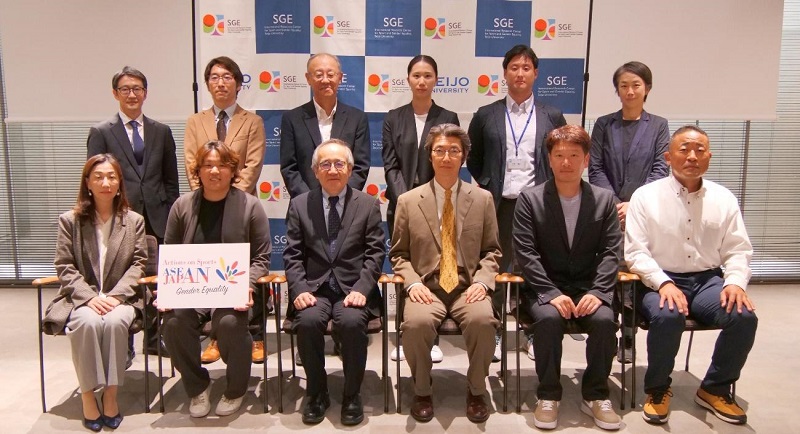
From top left, Atsushi Abe (Division Manager of the Policy and Planning Department of the Japan Sport Council), Takahiro Sato (Special Visiting Researchers of the SGE Center, Professor and Chair International Development and Peace through Sport, Institute of Health and Sport Sciences, University of Tsukuba / Assistant to the President), Satoshi Shimizu (Special Visiting Researchers of the SGE Center, Professor, Institute of Health and Sport Sciences, University of Tsukuba / Special Advisor to the President), Yu Furuta (Postdoctoral Researcher of the SGE Center, Graduate School of Comprehensive Human Sciences, Doctoral Program in Physical Education, Health and Sport Sciences, University of Tsukuba), Yushi Miyazawa (Postdoctoral Researcher of the SGE Center, Graduate School of Comprehensive Human Sciences, Doctoral Program in Physical Education, Health and Sport Sciences, University of Tsukuba), Rieko Yamaguchi (Special Visiting Researchers of the SGE Center, Professor, Department of Management, Josai University)
From bottom left, Toko Tanaka (Special Visiting Researchers of the SGE Center, Professor, Interfaculty Initiative in Information Studies, University of Tokyo), Aya Noguchi (Lecturer, Faculty of Literature and Arts, Seijo University and Deputy Director of the SGE Center), Yoshiyuki Sugimoto (President of Seijo University), Yasuhiro Hirai (Director of the Research Institute for the Humanities and Social Sciences, Seijo University), Atsuhisa Yamamoto (Professor, Faculty of Social Innovation, Seijo University, Director of the SGE Center), Yuji Koyama (Chief of the Research Institute for the Humanities and Social Sciences, Seijo University)
Background and the significance of SGE
Yoshiyuki Sugimoto, President of the University, opened the press conference with a speech. Emphasizing our University's founding spirit, which places emphasis on respect for individuality, he spoke about his expectation of contributing through sports to resolving gender issues - which is one of the Sustainable Development Goals (SDGs).
Followed by Atsuhisa Yamamoto, Professor, Faculty of Social Innovation, Seijo University and Director of the SGE Center, explained the background and significance of the Center's establishment, as well as its activities.
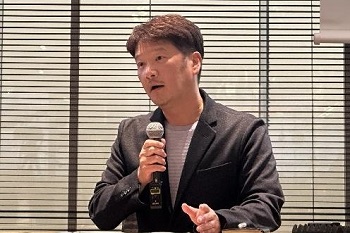
First, he explained the “dual nature of sports,”which has both been a symbol of issues surrounding gender and sexuality, and at the same time served as a platform for resolving those issues. Building on that, the center will focus on the potential of sports in solving social issues, by engaging with diverse stakeholders, and working actively to accumulate research that takes Asia's cultural and social context into account while promoting gender equality.
<Activities of SGE>
(1)International academic promotion through collaboration with ASEAN countries, East Asian countries and other regions
(2)Collection and reporting of research-related materials
(3)Hosting workshops, lectures, symposiums etc.
(4)Training of researchers, etc
(5)Utilizing specialized knowledge
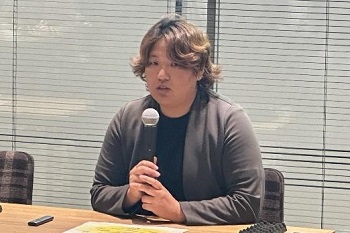
Aya Noguchi, Lecturer, Faculty of Literature and Arts, Seijo University and Deputy Director of the SGE Center, explained the relationship with the diverse stakeholders. Seijo Gakuen, which provides integrated education from kindergarten to graduate school, will play a central role and lead domestic initiatives related to sports and gender while expanding to international collaboration and dissemination, involving educational institutions, governments, companies, and non-profit organizations.
Professor Yamamoto, Director of the center, mentioned that gender equality is a very big issue and added “I would like to work together with the media, government, and businesses to create a big wave that will change society.”
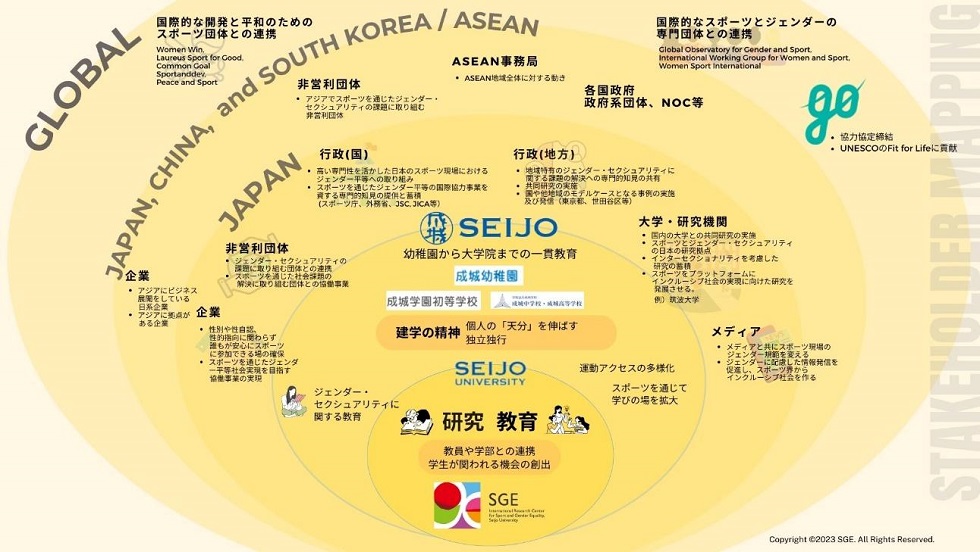
Following the press conference, we received the following comments from five Special Visiting Researchers of the Center.
Satoshi Shimizu - Professor, Institute of Health and Sport Sciences, University of Tsukuba / Special Advisor to the President
Since December 2010, the University of Tsukuba has officially been recognized by the IOC as the Center for Olympic Research and Education (CORE). University of Tsukuba has also launched a joint major in International Development and Peace through Sport (IDS) with the National Institute of Fitness and Sports in KANOYA and Japan Sport Council (JSC). In the same year, launched the Tsukuba International Academy for Sport Studies (TIAS), which is part of a Japanese government project, in conjunction with the Tokyo 2020 Games. Under these circumstances, faculty and students have taken internships and jobs at international NGO organizations, and university researchers have been invited to hold symposiums and lectures. We are very pleased to be able to utilize this network to advance our efforts together with Seijo University's research center. Even in IDS, the focus tends to be on boys, but I would like to be proactive about creating a place for girls in various sports, especially in Southeast Asia through this network.
Takahiro Sato - Professor and Chair International Development and Peace through Sport / Institute of Health and Sport Sciences, University of Tsukuba / Assistant to the President
As a global trend, gender equality has become a very important issue. What kind of contribution can we make to this Center? I think the first thing is the international definition of inclusion. The word “gender” is facing both a sexual and a physical issue. More specifically, as a global trend, inclusion has not respected people from diverse cultural backgrounds. As a Center, we believe that it is important not only to develop through sports, but to define inclusion also in our daily life. Second, the training of researchers and the publication of research results. The Joint Major in Sport and International Development Studies emphasizes theoretical research. Given that there is a gap between gender issues viewed in Japan and the international context, I would like to secure accurate data without bias or prejudice (through theoretical research) and report the results in international journals. I also think gaining knowledge and skills of research methods should be an important part of measuring results in the future. Together with this Center, we aspire to establish a definition as we move forward in our international outreach.
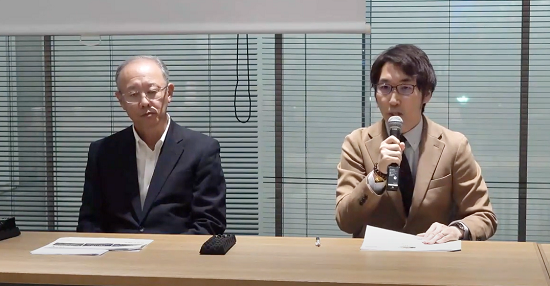
Rieko Yamaguchi - Professor, Department of Management, Josai University
Looking back 20+ years ago, when there was a lot of gender-free criticism and people were afraid to even use the word “gender,” I am deeply moved by the fact that a research center that deals directly with gender is established. Although there have been centers on women and sports in the past, the establishment of this Center, which uses the term “gender equality,” has the potential to expand the perspective of research to include issues related not only to women, but also to men and sexual minorities. Additionally, in this field where research has been centered mainly in Europe, the United States, and Western countries, I am very excited to communicate gender issues from Asia through sports.
Toko Tanaka - Professor, Interfaculty Initiative in Information Studies, Graduate School of Interdisciplinary Information Studies, University of Tokyo
I am the only Special Visiting Researcher at this moment who specializes in media, feminism, and gender, rather than sports. However, media and sports are inseparable. This is due to the fact that the media has treated sports as valid content from an entertainment perspective. And with the development of social media, athletes are now in an environment where they can actively make statements , but also receive harassment. I hope that my professional knowledge can be of use in some areas, as the achievements of female athletes are sometimes disseminated from a discriminatory perspective through social media and the media altogether. Additionally, Japan's gender gap index in 2023 ranks 125th (out of 146 countries), which is unfortunately much quicker to count from the bottom. Under these circumstances, rather than unilaterally investigating the current situation in Southeast Asia, I would like to promote gender equality from here, with a mindset of learning together and changing society together.
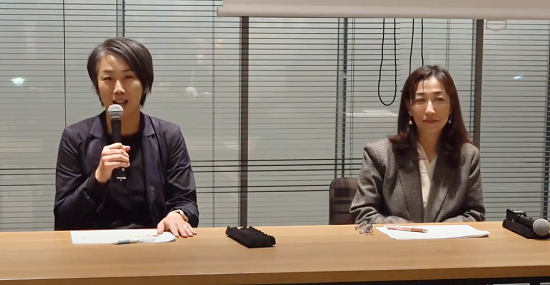
※Kanako Inaba - Associate Professor, Faculty of Humanities, Seikei University, was absent due to other work commitments.
We also received a video message from Dr. Lombe Mwambwa, Research Director of the Global Observatory for Gender Equality and Sport (*1), an International Research Organization that works to collate data and research to advance gender equality and physical education, physical activity and sport. She cited the importance of establishing SGE as creating a regionally rooted research institution in Asia and providing access to expertise for policy makers and program implementers. The SGE and the GO plan to collaborate together on various actions for the achievement of mutual aims.
At the end of the first session, we received the following comments from Sachiko Komine of the Marketing Communications Department of ASICS Corporation, which has been conducting a survey on the gap in exercise between genders since June of this year.
“As a brand that embodies the message of ‘Sound Mind, Sound Body,’ ASICS has been conducting continuous research on the relationship between exercise and mental state since 2019 (*2). We will continue to work so that everyone can have the opportunity to exercise freely and equally, and help everyone worldwide to have a sound mind and body. We would like to cooperate with SGE through exchanging information and other initiatives.”
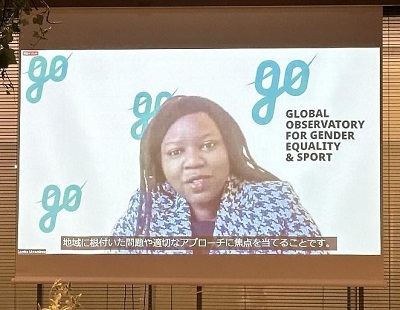

SGE aims to become an international research center that takes into consideration the regional context of Asia, collaborating with various domestic and international organizations that conduct research and studies sports and gender.
※1 Global Observatory for Gender Equality and Sport (GO)
An organization that coordinates and gathers research and expertise related to gender equality and sports with diverse stakeholders. In 2003, the framework of the Kazan Action Plan (KAP) was endorsed by UNESCO as an outcome of discussions at the 4th UNESCO-sponsored Sports Ministers Meeting (MINEPS IV), and was welcomed by 195 countries in 2017. Its establishment was affirmed at “MINEPS VII”in 2023, and it was announced as an international organization contributing to gender equality and sport aims including the UNESCO Fit for Life programme.
※2 ASICS Move Every Mind:https://www.asics.com/jp/ja-jp/mk/move-every-mind
On "ASEAN-JAPAN Actions on Sport: Gender Equality,” commissioned by Japan Sports Agency as part of the“Sport for Tomorrow”
From 2023, SGE has been selected to implement “ASEAN-JAPAN: Actions on Sport: Gender Equality,”which aims to promote gender equality in Japan and 10 ASEAN countries. This project is commissioned by Japan Sports Agency and Japan Sport Council as part of the “Sport for Tomorrow” program (*2).
At this press conference, Mr. Atsushi Abe, Division Manager of the Policy and Planning Department of the Japan Sport Council, also took the stage to explain the outline and significance of the Project.
At the beginning, Deputy Center Director Noguchi gave an overview of the project. This year, we announced that we will be hosting a workshop for policy makers in 10 ASEAN countries (held in Vietnam) and a survey on the challenges and needs of women's and girls' participation in sports (Philippines, Vietnam, Indonesia). She also added, “We would like to expand this survey to each ASEAN country, beyond the countries where it will be conducted this year.”
Followed with comments from Mr. Abe from the Japan Sport Council regarding the significance of this project.
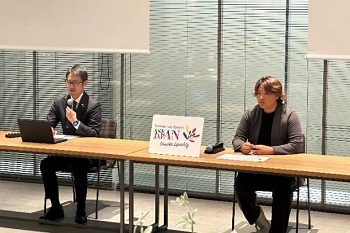
“This project aims to provide women and girls in ASEAN countries with access to sport and to provide them with all the benefits they can gain from sport, in order to improve the participation rate of women in sport, which is one of the priority areas of cooperation at the ASEAN-Japan Ministerial Meeting on Sports. Our ultimate goal is for everyone in the government of each ASEAN country to be able to realize various projects to achieve gender equality in sport in their countries. After analyzing the results and issues of past workshops for government officials and follow-up projects last year, we have received a business proposal from Seijo University of a mid-to-long-term plan based on a new strategy.”
Mr. Abe also mentioned that this project plan received attention at the ASEAN-Japan Ministerial Meeting on Sports recently held in Chiang Mai, Thailand, and added, “JSC, as the outsourcer, is also pleased to promote our efforts through this Project. We are very happy that this will be executed, and we look forward to seeing the results.”
※2 Sport for Tomorrow
An international cooperation and exchange project through sports promoted by the Japanese government.